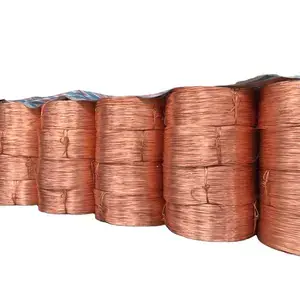When it comes to the copper industry in Germany, understanding the different grades of Millberry Copper is essential.
Millberry Copper, commonly known as Millberry Kupfer in Germany, plays a crucial role in various sectors, and having knowledge about the different grades can help individuals make informed decisions about purchasing copper.
In this blog post, we will explore the different grades of Millberry Copper in Germany, their characteristics, applications, and other factors that impact the grading process.
What is Millberry Copper?
Millberry Copper refers to copper wire that has been stripped of insulation and other impurities, leaving behind pure copper. It is commonly used in electrical applications, including wiring, motors, transformers, and other electrical components. The name “Millberry” originates from the appearance of the copper, which has a smooth and shiny surface, resembling the texture of a mulberry fruit.
Importance of Copper in Germany
Germany has a strong industrial base, and copper is a vital component in various industries across the country. Copper is an excellent conductor of electricity and heat, making it indispensable in electrical wiring and power transmission systems. Additionally, copper is extensively used in automotive manufacturing, construction, telecommunications, and renewable energy sectors. The demand for high-quality copper in Germany is constantly increasing, emphasizing the need for understanding different grades of Millberry Copper available.
Grades of Millberry Copper in Germany
Millberry Copper in Germany is classified into different grades based on specific criteria. These grades help determine the quality and purity of the copper, ensuring manufacturers and consumers receive the appropriate copper for their specific requirements. The three main grades of Millberry Copper in Germany are:
Grade A
Grade A Millberry Copper is the highest grade available. It has the highest level of purity and minimal impurities. The copper content in Grade A Millberry Copper is usually above 99.9%. Grade A copper typically has the best conductivity, making it ideal for applications that require high electrical efficiency. This grade is often used in power generation, electronic devices, and other high-end electrical applications.
Grade B
Grade B Millberry Copper is of slightly lower quality compared to Grade A. It still maintains a high level of purity, with a copper content of over 99.7%. Grade B copper is suitable for applications that demand good conductivity but do not require the highest level of purity. This grade is commonly used in construction, automotive manufacturing, and various electrical and electronic equipment.
Grade C
Grade C Millberry Copper is the most affordable grade available but has a lower level of purity compared to Grade A and Grade B. It can have a copper content ranging from 96% to 99.7%. Grade C copper is utilized in applications where the electrical conductivity requirement is lower, such as plumbing, heating systems, and general household electrical wiring.
Factors Affecting the Grading Process
The grading of Millberry Copper involves various factors that determine the quality and suitability of the copper for specific applications. These factors include:
Purity Level
The purity level of Millberry Copper is a crucial aspect of its grading. A higher purity level indicates a lower presence of impurities, resulting in better electrical conductivity and performance. Grading authorities assess the copper’s purity through rigorous testing methods, ensuring that each grade meets specific purity standards.
Copper Content
The copper content in Millberry Copper determines its quality and conductivity. Higher copper content translates to better electrical and thermal conduction. Each grade of Millberry Copper has defined minimum copper content requirements to meet industry standards.
Metallic Impurities
The presence of metallic impurities can affect the quality and performance of Millberry Copper. Grades A and B have stricter limits on metallic impurities to maintain high purity, while Grade C allows a slightly higher tolerance for impurities in consideration of its designated applications.
Physical Characteristics
Apart from chemical composition, physical characteristics such as wire diameter, flexibility, and surface condition also impact the grading of Millberry Copper. These characteristics determine the usability and suitability of the copper in specific applications, ranging from fine electrical wiring to heavier industrial applications.
Applications of Different Grades of Millberry Copper
Each grade of Millberry Copper serves different purposes based on their conductivity, purity, and other characteristics. Understanding the applications of each grade can help individuals make informed decisions when purchasing copper. Let’s explore the applications of each grade in detail:
Grade A Applications
Grade A Millberry Copper, with its exceptional purity and conductivity, finds its applications in various high-end industries. Some of the common usages include:
- Manufacturing of high-performance electrical wires and cables
- Production of electrical connectors for aerospace applications
- Electrical components in advanced electronics and telecommunications systems
- Power generation and transmission systems
- Semiconductor manufacturing and integrated circuit production
Grade B Applications
Grade B Millberry Copper, with its good conductivity and slightly lower purity, is suitable for a wide range of applications with slightly relaxed requirements. Some of the common usages include:
- Electrical and electronic components in automotive manufacturing
- Building wiring and electrical installations
- Manufacturing of transformers and motors
- Plumbing systems and fittings
- HVAC systems and heat exchangers
Grade C Applications
Grade C Millberry Copper, with its lower purity and moderate conductivity, is primarily used in applications where electrical efficiency requirements are lower. Some of the common usages include:
- General household electrical wiring
- Heating systems and radiators
- Plumbing fittings and fixtures
- Craft and artistic applications
- Ornamental and decorative copperwork
Buying Millberry Copper in Germany
When purchasing Millberry Copper in Germany, several factors need to be considered to ensure the quality and reliability of the product. Some key points to keep in mind include:
Reliable Suppliers
It is crucial to choose reputable and reliable suppliers when buying Millberry Copper. Look for suppliers with a proven track record in the industry, positive customer reviews, and certifications that validate their commitment to quality standards. Reliable suppliers prioritize the purity and quality of the copper they offer.
Quality Assurance
Confirm that the Millberry Copper you intend to purchase meets the desired grade specifications. Ask for certifications or test reports that verify the purity, copper content, and other required standards. Quality assurance ensures that you are receiving the desired grade of copper for your specific application.
Pricing Factors
Consider the pricing factors associated with different grades of Millberry Copper. Grade A, being the highest grade, usually commands a higher price compared to Grade B and Grade C. Evaluate your specific application requirements and budget constraints to make an informed decision based on the grade that best suits your needs.
Conclusion
Understanding the different grades of Millberry Copper in Germany is essential for anyone involved in industries where copper plays a significant role. Grade A, Grade B, and Grade C variations cater to different applications, with varying levels of purity and conductivity. By comprehending the quality standards and applications of each grade, individuals and businesses in Germany can make informed decisions when purchasing Millberry Copper. Remember to rely on reputable suppliers, prioritize quality assurance, and consider the specific requirements and budget constraints of your application. With this knowledge, you can utilize Millberry Copper effectively to ensure optimal performance in your respective industry.








Hello!! My name is Annabella
I love to eat, travel, and eat some more! I am married to the man of my dreams and have a beautiful little girl whose smiles can brighten anyone’s day!